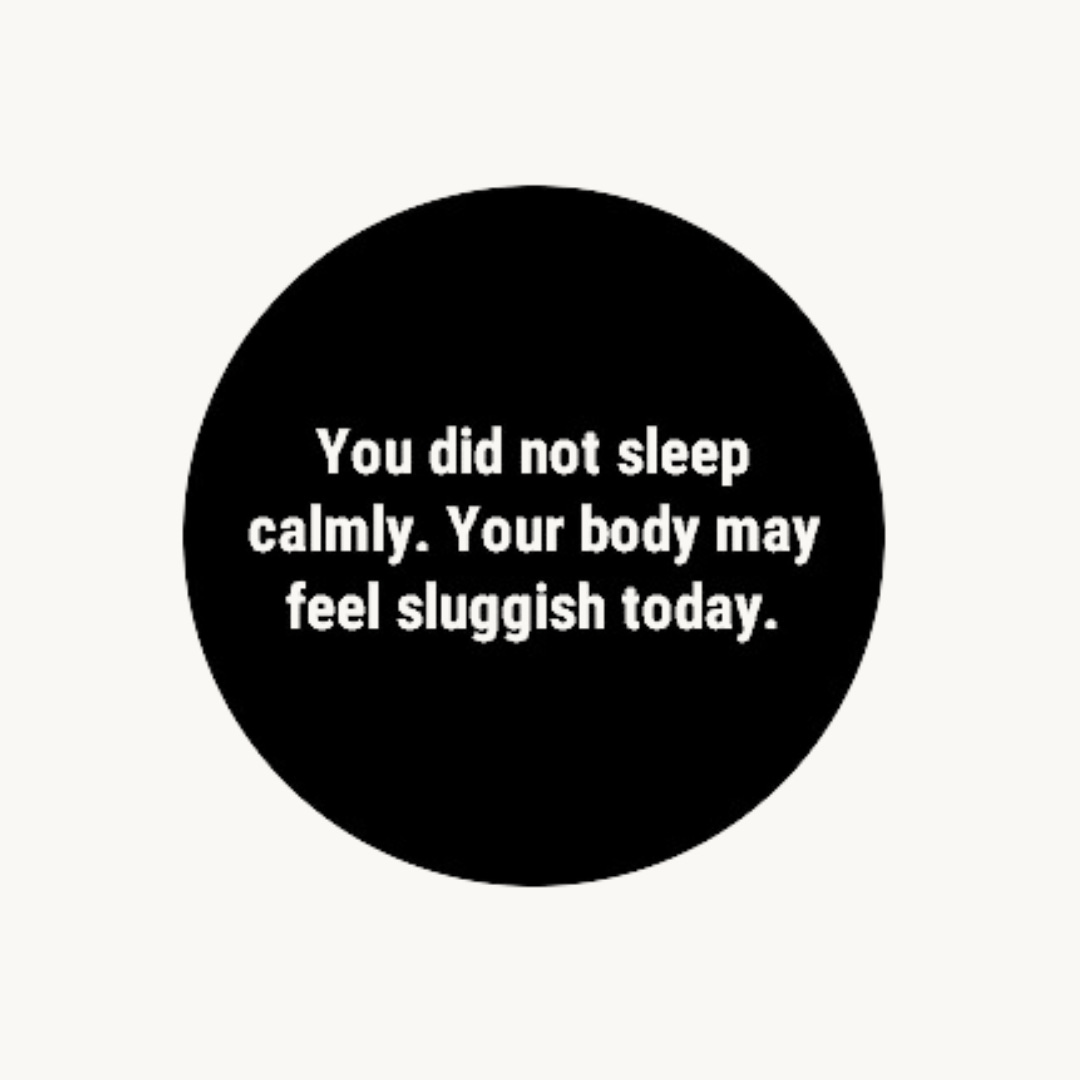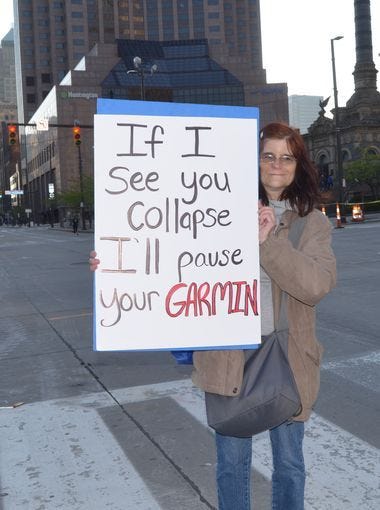My Garmin Watch Kept Yelling at Me
It knew something was off, but I didn't believe it.
I recently purchased a Garmin Epix Pro smartwatch to help me train for an upcoming bike trip to Tuscany. I happily abandoned my Apple Watch (which, annoyingly, needed recharging every single night) and Oura Ring (the gold had worn off, and I refused to pay the monthly subscription that came with a new ring).
Plus, I wanted the same watch as my husband so we could speak the same nerdy data language. With the data that Garmin fed me, my training and, really, my life was set.
 Tiktok failed to load.
Tiktok failed to load.Enable 3rd party cookies or use another browser
But once the thrill of always knowing my exact altitude and time of sunset died down, I found myself staring at the tiny health graphs on my wrist a lot. Unfortunately, Garmin had an Instagram-ish, magnetic pull on my attention. Whenever I was faced with something where I had to sit and really think (you know, work), I’d check to see the hours of REM that I got last Tuesday or check my energy levels after the last ride.
Somewhere along the way, I stopped checking in to see how I felt and instead would turn to my Garmin. Hey Garmin, how am I doing? Am I tired right now? Should I be napping? Should I go to bed earlier? Should I train or take a rest day? What do you think of this sweater? It was an odd and silent dialogue with a watch, albeit a smart one.
Let me share how my thinking went from “Oh, interesting.” to “What the actual hells bells is wrong with me?”
The (super addictive) Morning Report
For those of you that are Garmin-less, the Morning Report is what appears on your watch each morning. It gives you a quick snapshot of your night’s sleep with your overall sleep score, a note from your sleep coach (You didn’t get enough REM), heart rate variability (HRV) status, and a training readiness score (You’ve been taking it easy. Time to ramp up), the day’s weather forecast and a positive affirmation (Let’s make today better than yesterday!)
Now, I pride myself on no TVs or phones in my bedroom. No tech at all. I’ve never ever been a person to wake up and check my phone. But, with Garmin in my life, I reached for my glasses each morning to read my sleep and HRV scores on the glowing blue circle strapped to my forearm. Tell me Garmin, how was this day going to go?
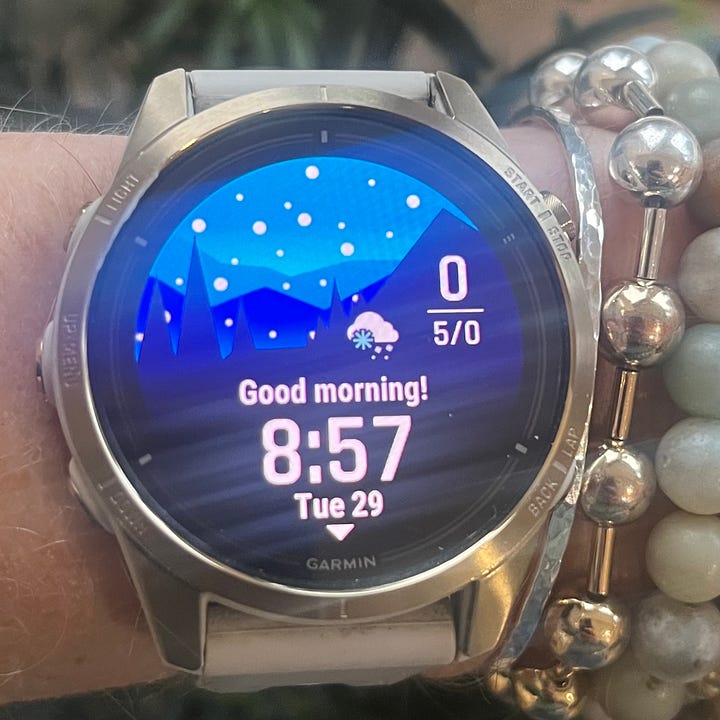
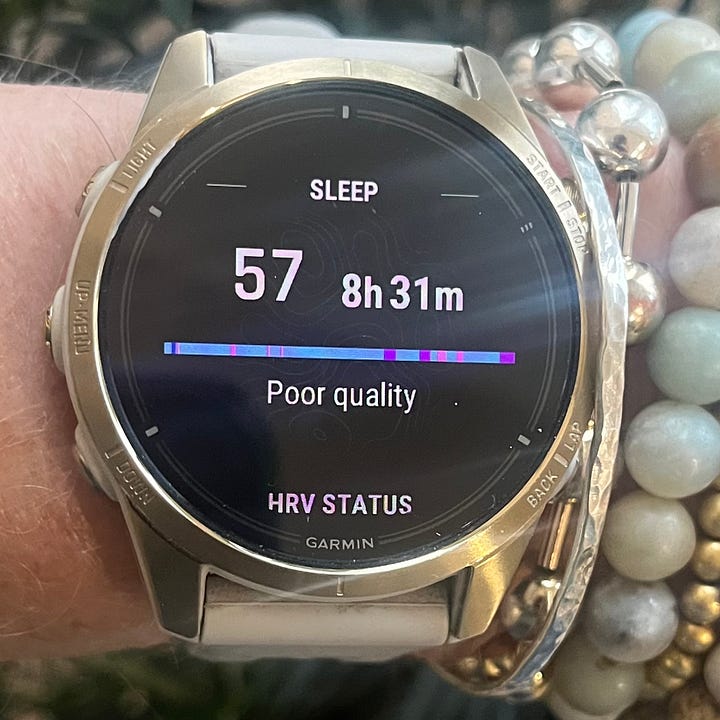
My Body Battery
After I read the Morning Report, I checked my Body Battery, Garmin’s energy monitoring score. How much energy did I have for the day? Garmin calculated this based on my sleep quality, heart rate, and HRV. Throughout the day, I’d watch live as my body battery drained as quickly as my old Apple Watch battery. We both struggled to have anything left in the tank by 8 pm.
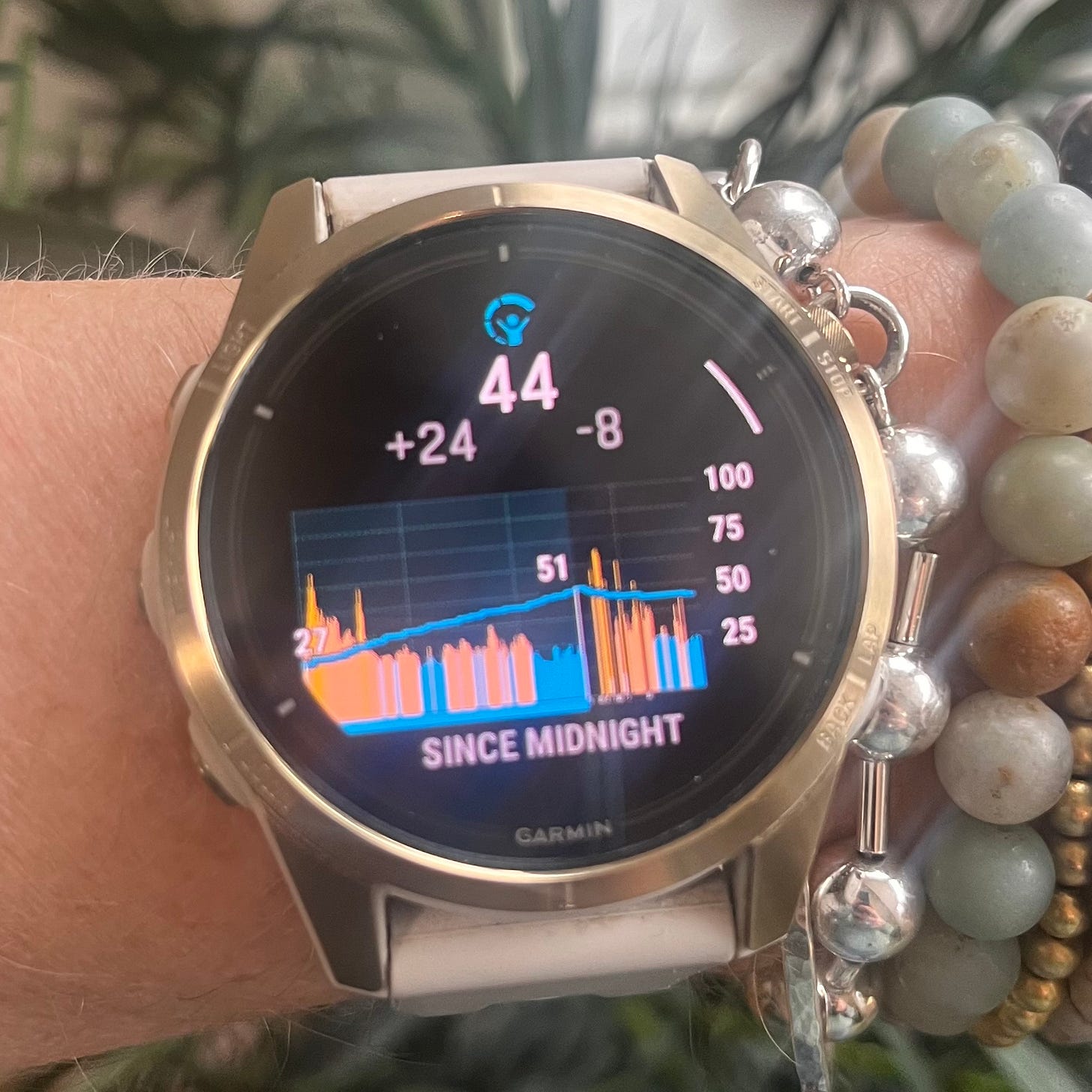
“What’s your body battery at?” My husband and I would compare numbers first thing in the morning and after work. (I know. Kind of lame, but you must understand, we were athletes training for the hills of Tuscano.)
What frustrated me was that every morning his battery was always charged 80-90%, while I struggled to crack 50%. In the evening, I’d be at 5% and he exclaim “FIVE! How are you at five? I’ve never been below 40%.”
As I lay exhausted on the couch, I started to question how our human batteries could be so different? Male vs. female? Rides every day vs rides a few times a week? Training for a long time vs. just starting training? It made no sense.
And I started to feel terrible about myself.
Sleep Score
And then there were the sleep scores. Mine were abysmal. I thought I slept well (Everyone wakes up tired, right?), and Garmin would tell me that I got a good amount of sleep, but I didn’t get enough REM. “Expect to feel sluggish today” was on every Morning Report. And, of course, that poor-quality sleep meant my battery was never fully charged. And on and on it went.
The Downward Slide
The love for my new friend was wearing off and I moved into an exasperated, this-watch-is-so-stupid place.
It’s not right. It’s not accurate. I don’t believe any of it. How does it measure this stuff anyway? There’s no way it can know this. Humans are complicated. They don’t even have batteries. And I truly resented Garmin for making me think about about my body as if it were a Tesla.
I got into this Garmin relationship to track my road rides, show me how I’m improving, pump me up, get me going, and trusted that Garmin would guide me to a level of fitness where I wouldn’t be the slowest in the group.
But instead, every morning I took a psychological hit as I was continuously told that I had a bad sleep, you’ve got nothing in the tank and take it easy. Expect to be tired today. Of course, by the mere suggestion of “You’ll be tired”, I felt tired.
Wait. A. Second.
I hung in there with Garmin, the abuser. And weeks before I was to leave for Italy, an off-handed comment about my thyroid from my fully charged husband made me stop in my tracks. Wait. Maybe there was something wrong with me, not the watch.
I remembered my Naturopath telling me about Dr. Denis Wilson’s work. He believes that a low body temperature can indicate hypothyroidism.
I turned to my frenemy, Garmin, to see what my nightly body temperature was. Low, low and low. Every. Single. Night. I checked with my husband, and he never went below 37 degrees Celsius. Garmin, you’re a genius.
Garmin X Italy
I arrived in Italy with adjusted thyroid meds. Every day I shot back an espresso, crushed hills, slurped pasta, and recorded my rides on the big G. Every night I scrolled through my activity data like a proud Olympic athlete. I had proof that I hit 55Km/hour on a downhill and beat my husband up the a hill. Love you, Garmin.
Not surpisingly, many in our cycling group also trained with Garmin watches. After two days of long, hilly rides, we were all giggling about how the gaggle of Garmins were collectively honking to us about “Over-training!” and “Take it easy!!” and “You need a rest day.” Gah, Garmin, read the room.
Looking back, I believe it was simply unfortunate timing that my thyroid checked out at the same time I strapped on a new smart watch. In my tech-citement, I let Garmin overpower my instinct. I didn’t like what it was telling me and I simply became angry at the watch’s “stupidity” and did not pause to consider if there was maybe a bit of truth to what it was saying. I never checked in with how I really felt. And if I had, the answer would have been very, very tired.
Now that my thyroid is back to normal, the messages from Garmin are positive, friendly and motivating. I plan to continue to follow the Garmin numbers but I don’t need to read them the moment I open my eyes. #techboundaries
And… for the record, my husband and I do have conversation on topics that do not involve human batteries. Mostly, we talk about where to ride next.
Garmin, you’re alright.
(This article is for informational purposes only and does not constitute medical advice. Always consult with a qualified healthcare professional before starting any new diet or wellness program or if your Garmin is yelling at you.)





